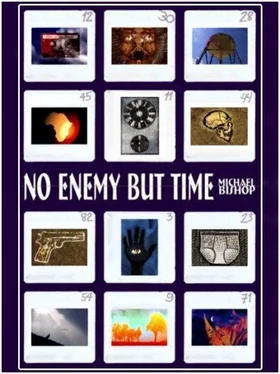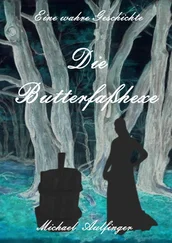The second circumstance determining Helen’s status among the Minids was her barrenness. She had no child. She showed no signs of ever conceiving one. In fact, she stood outside the more or less formal pair-bonding relationships structuring the habiline band. Undoubtedly she had had paramours among the males. Alfie had almost certainly plucked from her the fresh gardenia of her maidenhood, for his chieftaincy of the Minids gave him carnal access to almost every female who had attained menarche.
Those exempt from his lust included Dilsey (probably his mother) and, among the younger women, both Miss Jane and Odetta (perhaps his sisters). But if Helen had coupled with Alfie or any of the other hunters, she had apparently never conceived. Her breasts were high and small, her loins lithe and undisfigured.
At present, whatever her sexual behavior in the past, she seemed to avoid engaging in amorous dalliance with the males. In view of her vigor and appetite in other areas of physical indulgence—running, killing, eating, excreting, climbing, and rough-housing with the Minid children—this scruple puzzled me. Had her barrenness, exiling her from the tender domestic concerns and the friendship of female habilines, inflicted upon her an aversion to the woman’s role in the sex act? Well, possibly. She ran with the males, and cocks of a feather may sometimes celebrate the joys of treading their jennies.
Together, Helen’s size and barrenness permitted her to fashion, within a social structure predicated on cooperation, a lifestyle of surprising autonomy. It would be false to argue that she had the best of both worlds (male and female), for only Guinevere and Emily on the distaff side ever treated her with affection; whereas among the hunters she had achieved “equality” not as another competent comrade but as a potent secret weapon (the bipedal equivalent of a Remington 30.06) against the merciless enemy Hunger.
Still, being childless, she came and went pretty much as she chose; and, although Roosevelt or Alfie might occasionally go on solitary hunts, Helen was the only Minid who regularly ventured well beyond the citadel for longer than an hour or two.
Once, in fact, Helen disappeared for an entire afternoon, and I worked myself into a lather imagining that she had fallen to predators. She returned a little before sunset carrying a baboon infant, still alive, which she cuddled and unintelligibly wooed for several hours. How Helen was able to cull the baby from its troop without sustaining a scratch or setting off a riotous chase over the grassland, I cannot guess—but somehow she had managed. For most of the evening, the other Minids—with the exception of the children—kept their distance. Finally, however, Alfie sauntered into the little creature’s field of vision, frightening it so badly that it bit Helen. This incident ended Helen’s brief tenure as madonna, for Alfie, after fussing for a moment over her wound, insisted that she relinquish her baby to Jomo. Jomo and Malcolm carried the infant baboon into the darkness, and that was the last any of the rest of us ever saw it. I derived some consolation from the fact that it did not come back to us in bloody sections.
* * *
Helen liked me for my oddness, I think. In my own way, I was as peculiar a Minid as she—tall enough to discomfit Alfie, sufficiently fleet and steadfast to run at her side without lapsing, and enough of an inveterate loner to chafe under the sometimes onerous burden of habiline togetherness. For these and other reasons she would occasionally tolerate my company on one of her private foraging expeditions.
The benefit to me was twofold. I got out of New Helensburgh without having to follow the men, and I learned some clever food-gathering techniques that made it possible for the Minids to remain where they were when drought seemed to demand that they pull up stakes for a happier hunting ground.
Here is one such technique:
Over a stretch of savannah from which the snow-clad peak of Mount Tharaka rose skyward like a colossal, milky diamond, Helen led me into a glade of whistling thorns. Inside this copse she took pains to move as silently as she could. Although less adept at such stealth, I took pains to follow her example. I soon realized that she was searching for bird nests lodged in the thorny branches of the shrubs. I did not understand how we were going to be able to grab any birds, though.
A thought hit me. “Eggs?” I asked Helen. “ Huevos?” I made an egglike circle with my thumb and forefinger, then made a show of extracting this sign from between my legs. Helen merely curled her upper lip back in negation and maybe disgust.
By creeping up beneath a nest, squinting long and hard at its bottom, and then snatching from it a fine, fat mouse—which she deftly squeezed to death while withdrawing her hand—Helen demonstrated what our task was and how to proceed with it. Empty nests permitted light to pass through them. Nests sheltering mice, however, appeared tightly woven from the bottom. If you reached into a twiggy domicile through which no light shone, your reward was usually a rodent.
We crept through the whistling thorns evaluating every nest we chanced upon, and at the end of an hour we had five furry mice for our pains. I cached them in the enormous, snap-down pockets of my bush shorts, which were now so frayed and seam-worn they hung upon me like an overelaborate breechclout.
Twilight sifted through the thorn bushes, for we had begun this outing quite late; and the coming of darkness, which my newfound avidity for mouse snatching had pretty much disguised from me, was suddenly plain. Helen was still not ready to go—despite the fact that the darkness was going to invalidate our method of discovering occupied nests. Although I tried to hasten our departure from the thicket, she continued to tarry.
The problem was that for Helen this thicket was an irresistible supermarket of tree mice. In early starlight, because her vision was so much keener than mine, she managed to sniggle two more of the hapless rodents. My pockets bulging, my brain bugling retreat, I could not persuade her to leave off hunting. Maybe the only way to win her over was to let her get her fill.
I found my penlight in my pocket, under a warm, bleeding mouse, and showed Helen how to operate the gizmo. She handled it with such enthusiasm and skill that she could have prolonged our hunt almost indefinitely, spotlighting nests and nabbing any occupants. However, the sight of that tiny beam stabbing upward through the thorn branches reminded me of another spotlight, a spotlight seventeen years into my twentieth-century past, and I grabbed the penlight from Helen’s hand and brusquely returned it to my pocket.
Helen’s astonishingly luminous eyes said, “Indian giver,” but she did not try to reclaim the instrument.
Because it was now too dark to mouseknap by the Helen Habiline Method, she reluctantly gave up her sport and led me back to the Minid citadel.
* * *
Among the hunters Genly was Alfie’s sole rival for undisputed leadership of the band. However, he was a rival who had apparently failed to achieve victory in some pivotal past confrontation. As a result, Genly bore a deep scar on one forearm (habiline teeth marks, if I was any judge) and carried himself with a kind of saintly diffidence. He had redirected his aggressive instincts into the hunt, during which he could sometimes behave so belligerently—battering a warthog to death, driving a troop of baboons out of an attractive foraging area, snapping the neck of a colobus monkey with his teeth—that even Vince Lombardi would have quailed before such meanness. On these occasions, gentle Genly unloosed scads of repressed hostilities, bees out of a jostled hive, and Alfie would glance nervously sidelong, bemused by the intensity of his former rival’s rage.
Читать дальше



![Ally Carter - [Gallagher Girls 01] I'd Tell You I Love You But Then I'd Have to Kill You](/books/262179/ally-carter-gallagher-girls-01-i-d-tell-you-i-lo-thumb.webp)








